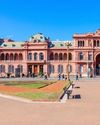History and fusion cuisine blend in Peru’s capital city.

PERUVIAN CUISINE JUST might be the most exciting thing happening in the global culinary scene that you don’t know about. That’s probably because “Peruvian” doesn’t yet bring to mind a strong, concrete image. Mexican, Japanese, Thai, Indian — these gastronomic brands bring something familiar to the imagination. There’s a specific meal or dish we can’t help but come back to.
That’s not the case with Peruvian, though that’s not altogether surprising. Despite Lima’s evolution into one of the world’s preeminent culinary cities, Peruvian cuisine comprises too many things to bring just one meal, just one taste, to immediate recollection. To begin with, there are indigenous influences — most prominently the Incans, whose historic empire you’re likely familiar with from that postcard view of Machu Picchu.
Immigrants from Spain, Italy and Germany offered their touch alongside incoming Asian and West African populations. Tastes and ingredients were modified based on what was available in this unfamiliar slice of land along western South America, blending with the four original staples of Peruvian cooking: rice, potatoes, quinoa and beans. Over time, this hodgepodge of cultures on a plate developed into a paragon of fusion cuisine, which U.S. food critic Eric Asimov of The New York Times described as “one of the great cuisines of the world.” That’s something with which the likes of Gastón Acurio, Peru’s super chef, will agree.
This story is from the February 2017 edition of Global Traveler.
Start your 7-day Magzter GOLD free trial to access thousands of curated premium stories, and 8,500+ magazines and newspapers.
Already a subscriber ? Sign In
This story is from the February 2017 edition of Global Traveler.
Start your 7-day Magzter GOLD free trial to access thousands of curated premium stories, and 8,500+ magazines and newspapers.
Already a subscriber? Sign In

Nurturing Nature
Connect with the abundant flora and fauna of Belize.

Sojourn by the Sea
Discover plenty to smile about in Thailand’s exotic islands.

Colorado Dreaming
For family ski fun, Snowmass and Beaver Creek steal the show.

The Great Outdoors
Anchorage opens the door to all that is wild in Alaska.

Buenos Aires on Foot
Hit the highlights with online itineraries and the city’s free app.

Above and Beyond
Global Traveler celebrates the 2021 winners of the GT Tested Reader Survey awards.

Wellness Wonderland
Reboot at Lake Austin Spa Resort in Texas Hill Country.

Good Vibes
Adelaide’s West End thrives as a hip urban hub close to nature.

Solo Voyages
Cruise lines adapt policies to accommodate those traveling alone.

Grand Slam
Follow the pro tennis tour around the world.